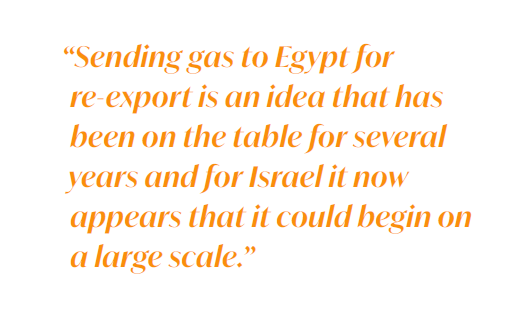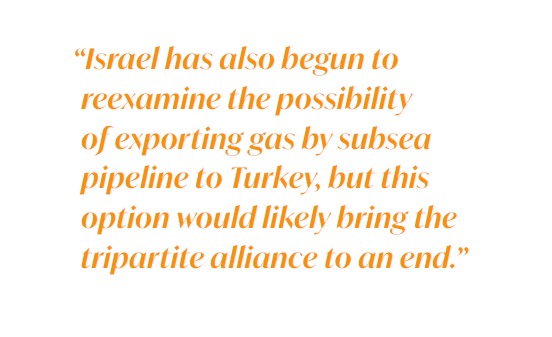EastMed leaders reaffirm energy ties as decision time nears [Gas in Transition]
Cypriot president Nicos Christodoulides welcomed the prime ministers of Greece and Israel to Nicosia on 4 September for the ninth summit meeting of East Mediterranean leaders to reaffirm their commitment on cooperating towards establishing the region as a source for international energy through natural gas and electricity exports.
The tripartite alliance, as it is called, has been meeting since 2016 with the purpose to present a united effort on development of the region’s natural resources and to enhance security in the East Mediterranean. When the group was formed, Turkey was beginning to assert a particularly threatening attitude towards the region. Ankara’s position on the East Mediterranean, much of which it considers to be its ‘Blue Homeland,’ provoked standoffs with the Greek navy in the Aegean in 2020, and continues to warrant caution among those foreign companies working in the Cypriot and Greek exclusive economic zones (EEZs).
The early meetings between Cyprus, Greece and Israel led to a similar series of mini-summits between Cyprus, Greece and Egypt, and eventually gave rise to the East Mediterranean Gas Forum (EMGF) which now includes Egypt, Greece, Cyprus, Israel, Jordan, France, Italy, and the Palestinian Authority, with the US, European Union and the World Bank Group as observers.
Israeli prime minister Benjamin Netanyahu and Greek Prime Minister Kyriakos Mitsotakis joined Christodoulides in reaffirming their governments’ support for developing and exploiting energy projects that would benefit their own countries and others, specifically EU members, and Egypt.
“We agreed that the energy sector, and in particular, natural gas, electricity and renewable energy, is a solid foundation for cooperation in the region, based on international law including the law of the sea and the respect of all states to exercise their rights in their respective EEZ/Continental Shelf,” a joint statement issued at the end of the meeting said.
“In light of the growing need for energy diversification and interconnectivity, due to the geopolitical developments, we reaffirmed the common interest to advance prospects for a reliable energy corridor from the Eastern Mediterranean basin to Europe,” the statement said. “In this context we stressed the importance of further promoting energy synergies with like-minded countries including the EMGF and regional projects such as electrical interconnections, like the EuroAsia Interconnector, and possible natural gas/hydrogen pipelines,” it added.
The three leaders promised to address the challenge of climate change by reinforcing joint efforts through regional cooperative projects, R&D, innovative energy technologies and promoting further regional energy connectivity, according to the statement.
The three leaders checked all the boxes required to carry out a successful meeting of this nature, but while everyone was still onboard, there was nothing of significance to come from the meeting.
An opinion piece in the Cyprus Mail published a day after the gathering summed up local cynicism about the alliance and development of the island’s gas resources:
“Despite all the progress made on a range of matters, the main reason for the creation of the tripartite alliance – energy – has not moved from the realm of big words and declarations,” the English-language daily stated. “While the tripartite alliance has boosted cooperation on a range of issues among the three countries, energy has not been one of them. Energy cooperation has never moved beyond the big declarations to anything of practical import [importance] and it appears, after the ninth tripartite alliance summit, there are no plans to change this.”
Time to decide on gas exports to Egypt
Israel began to produce gas for domestic consumption from its offshore 10-trillion ft3 Tamar field in 2013 and it began to export gas to Jordan and Egypt in 2017. Phase one production from the giant, 22-trillion ft3 Leviathan gas field began in 2019.
The current plan undertaken by operator Chevron calls for production capacity at Leviathan to rise from 12.5bn to 21bn m3/yr, and for Tamar output to grow from 10.5bn to 15.5bn m3/yr. Israeli media reported that combined output during 2022 was 21.3bn m3. Of that, around 9.2bn m3 was exported to Egypt and Jordan. The two fields provide Israel with about 70% of its electricity.
 During a visit in early August to the Leviathan platform, which lies some 150 km off the coast of Haifa, Israeli energy minister Israel Katz called for Israel to increase its level of exports.
During a visit in early August to the Leviathan platform, which lies some 150 km off the coast of Haifa, Israeli energy minister Israel Katz called for Israel to increase its level of exports.
“Our ability to export gas, in a controlled manner, as I’ve said, is a great diplomatic weapon that strengthens Israel’s position in the region, and the world,” Katz remarked. “If we take the economic aspect…and the diplomatic benefit for strengthening Israel’s position, surely we need to make the decision to increase the export of gas, according to the quantity needed.”
As gas output in Israel rises, so too should the country’s exports to Egypt, which is in need of more gas for domestic use, and where two LNG export facilities provide the opportunity for deliveries further afield.
Sending gas to Egypt for re-export is an idea that has been on the table for several years and for Israel it now appears that it could begin on a large scale.
Netanyahu has also spoken of building a gas pipeline to Cyprus for the purpose of generating electricity that would be shipped back to Israel through the yet to be constructed EuroAsian Interconnector, an electricity cable that would ultimately extend 2,000 km across the East Mediterranean to connect Israel, Cyprus and Greece – and Europe. The Israeli prime minister has also suggested exporting Israeli LNG from Cyprus through the use of modular LNG units set up on the island.
Israel has also begun to reexamine the possibility of exporting gas by subsea pipeline to Turkey, but this option would likely bring the tripartite alliance to an end.
The gas issue is also finally shaping up for Cyprus, which in August received a modified version of a development plan for the Aphrodite field from operator Chevron and its partners Shell and Israel’s NewMed Energy. Chevron proposes to develop the 4.4-trillion ft3 Aphrodite field and send production to Egypt via a subsea pipeline to Shell’s offshore West Delta Deep Marine (WDDM) processing facility and then on to the Shell-operated Idku LNG export plant. Eni, a major developer in Egypt, as well as in Cyprus, operates Egypt’s other LNG facility at Damietta.
The problem with Aphrodite is that the Cypriot government has rejected Chevron’s plan because of the proposed modifications. Chevron wants three production wells instead of five and it wants to eliminate the floating production unit (FPU) that was included in the 2019 development plan that was drawn up by previous operator Noble Energy. Chevron bought Noble in 2020.
Cyprus argues that this plan provides it with no option for further development of Aphrodite. Three wells will not allow for reinjection when reservoir pressure gets low, and no FPU will mean it will not be about to process the gas for any future domestic connection or export option.
Cypriot energy minister George Papanastasiou has already begun negotiations with Chevron officials and they will continue until the end of September, when the two sides have agreed to resolve the matter.
However, as noted by the Cyprus Mail editorial, the island has grown disenchanted with the prospect of natural gas resources being developed and a refusal by the government could very well mean that Aphrodite – discovered in late 2011 – could remain a stranded asset for a long time to come.
The US government, an observer in the EMGF, keeps close track of energy issues in the region. It has urged Cyprus to accept Chevron’s proposal, which would be about $1bn cheaper to implement than the 2019 plan.
According to a US source cited by Reuters, Chevron’s proposal would get Aphrodite gas to market faster and with a lower carbon footprint as it does not require building large infrastructure. The target market time is 2027.
“Connecting [Aphrodite] to Egypt will help them [Egypt] with peak domestic consumption in the summer, add stability, reduce tensions in the region, and allow exports for Europe,” Reuters quoted the source as saying.
One of the distinctions that the Biden administration is making is one between expensive and unnecessary infrastructure projects, the report said. It is urging less work-intensive interconnections that will become unneeded as economies transition to cleaner forms of energy.
Could EastMed's fate be known this year?
Something will have to give. Israel is pumping gas but lacks a satisfactory export route. So does Cyprus, but its gas is still deep under the sea. As their regional partner, Greece is ready to receive East Mediterranean gas and send it into the EU through LNG terminals and pipelines.
Greece is already serving as a connector country between distant gas resources and Europe. The Southern Gas Corridor carrying Azeri gas to EU states runs through northern Greece to Italy. Greece has a gas connection to Bulgaria and other Balkan states through the Interconnector-Greece-Bulgaria (IGB) pipeline. Greece has one LNG terminal at Revithoussa and is building another at Alexandroupolis that is due to begin operating soon.
Athens wants these terminals and its pipeline system used to take delivery of East Mediterranean gas that has been processed into LNG at Egypt’s LNG export facilities, which are not very far away.
“We [Greece] have a great interest in seeing how the Israeli and Cypriot gas will be exported to the EU and to respect solutions that have the blessing of the two governments, but they will also be tested by the markets,” Mitsotakis told reporters during the Nicosia gathering.
Greece has long-supported the EastMed Gas Pipeline project, a 2,000-km subsea pipeline that would transport East Mediterranean gas to Greece and Italy. But the project was not specifically mentioned publicly during the Nicosia meeting. Its $6bn-$7bn price tag, the volume of infrastructure, the amount of work, and the anticipated political wrangle with Turkey in building it across the Mediterranean has probably put it in the “unnecessary” category. Washington dropped its support for the project last year.
According to Netanyahu, these issues could wrap up in a short time: “We [Israel] will have to decide soon about how Israel exports its gas and the same decisions have to be made by Cyprus,” he told reporters in Nicosia. “We are looking at the possibility of cooperating on this. Those decisions will be made, I think, in the next three to six months, probably closer to three months,” he added.
While it appears that all three countries have been searching for the perfect solution on how to get their gas to places where it can be sold, they may find that they will have to go with the flow and see where it takes them.



